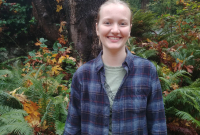The Cortes Islanders smiling, singing, and snacking outside the Gorge Harbour clapboard community hall might have been gathered for a spring picnic — if it weren’t for the sizable collection of anti-logging protest signs pitched across the lawn.
Any collective cheer quickly dissipated and anger bubbled up in the crowd on Tuesday afternoon when Mosaic Forest Management representatives began to outline draft plans for logging operations on the small B.C. island over the next three years
Since the forestry giant in the Vancouver Island region announced its plans in January, many of the community’s 1,000 residents have been mobilizing to prevent the return of logging operations.

The tone at Mosaic’s information open house was decidedly different than the packed town hall meeting the forestry company was invited to in late April — where children were garbed in costumes depicting woodland creatures such as owls and mice and islanders shared the passion and vision they have for their forests, while outlining the community’s long history of resistance to logging.
Gary Lawson, Mosaic’s North Island general manager of operations, said following community input last month, the company still plans to log 7.5 hectares, or approximately 5 to 6,000 cubic metres of timber, this year.
But the company has made changes — deferring this year’s cut in some blocks where islanders expressed specific concern, particularly in the Upper Delight and the Blue Jay Lake watersheds, until the company can survey those areas with residents.
The latest plan is also a draft, Lawson said, adding Mosaic will host additional field walks with residents in the newly slated cut blocks off Blue Jay Road and the Gorge Harbour area to hear community concerns.
Of the 60 residents gathered, those that spoke were clear they aren’t interested in industrial logging at any scale, especially by a company that isn’t island-based.
There is no room for business-as-usual forestry when the planet is on the verge of climate catastrophe, said resident Lovena Harvey, describing the industry’s logging practices as archaic.
“We are at an impasse, we know what needs to happen for the sustainable future of the planet,” she said.
Protecting watersheds on the rocky island is important to maintain drinking water and mitigate the increasing wildfire risk of due to climate change, she added.
“Our island is a microcosm of the whole world because … we have a finite number of trees, we have a finite number of streams,” she said.

Mosaic aims to work on a similar scale to the Cortes Community Forest, said director of sustainability Molly Hudson. The company is proposing smaller cut blocks of approximately two hectares, and retention forestry methods — leaving certain trees or other features on the landscape for environmental, social, or recreational reasons.
“’We’ve made a good effort to try to learn what (sustainable) forestry looks on Cortes Island and how we can be a part of that,” Hudson said.
The forestry company is addressing climate change through its recently announced BigCoast carbon credit initiative that will defer logging in some of its old growth holdings for 25 years, she added.
Mosaic, which owns more than eight per cent of the island’s land base (1,085 hectares), expects to harvest approximately 10 hectares a year between 2022 to 2024,less than one percent of the island, the company said. It has also promised not to log trees more than 200 years old or old growth groves exceeding one hectare.
However, hundreds of residents signed an open letter to the company asking it not to log any trees aged 140 years or older, given little old growth remains on the island due to past logging.
Some residents argued Mosaic — which manages Island Timberlands and TimberWest — doesn’t have a track record to inspire community trust, citing destructive logging operations on neighbouring Read and Hardwicke Islands where clearcuts destroyed wildlife corridors and small stream sites respectively.
“You said you did a lot of talking there. And I see you're doing a lot of talking here. But in the end, what happens?”one resident said.

There hasn’t been any outside industrial logging activity on the island for a generation, and any resumption of similar operations was bound to meet some resistance, said Cortes Island regional director Noba Anderson.
She urged the company to work with the community to come up with a plan everyone could buy into, she said.
Anderson recently issued a letter to Mosaic, as well as the company’s two main investors, the public sector pension management entities BC Investment Management Corporation and the Alberta Investment Management Corporation suggesting as much.
The community has long pursued an alternate forestry model that resulted in the Cortes Community Forest initiative, which provides community benefits, something residents are telling her they don’t see in Mosaic’s recent proposals, she said.
One option might be to explore ways the community could buy the land from Mosaic, Anderson said.
“I’m just saying for me as a whole, I would really rather us put our energy into a collaborative effort rather than a confrontational one.”
Rochelle Baker / Local Journalism Initiative / Canada's National Observer







Comments
The question is, why does the company even have the right to do any of this? Our system for deciding who gets to put the finger on timber has serious problems.